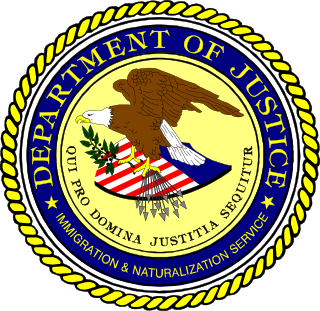Related Research Articles

The United States Immigration and Naturalization Service (INS) was an agency of the U.S. Department of Labor from 1933 to 1940 and the U.S. Department of Justice from 1940 to 2003.

The United States secretary of homeland security is the head of the United States Department of Homeland Security, the federal department tasked with ensuring public safety in the United States. The secretary is a member of the Cabinet of the United States. The position was created by the Homeland Security Act following the attacks of September 11, 2001.
The U.S. Immigration and Customs Enforcement (ICE) is a federal law enforcement agency under the U.S. Department of Homeland Security. ICE's stated mission is to protect the United States from the cross-border crime and illegal immigration that threaten national security and public safety.

Susan Ellen "Zoe" Lofgren is an American politician serving as a U.S. Representative from California. A member of the Democratic Party, Lofgren is in her 13th term in Congress, having been first elected in 1994.

The Canada Border Services Agency is a federal law enforcement agency that is responsible for border control, immigration enforcement, and customs services in Canada.

The U.S. House Committee on the Judiciary, also called the House Judiciary Committee, is a standing committee of the United States House of Representatives. It is charged with overseeing the administration of justice within the federal courts, administrative agencies and Federal law enforcement entities. The Judiciary Committee is also the committee responsible for impeachments of federal officials. Because of the legal nature of its oversight, committee members usually have a legal background, but this is not required.

The United States Senate Committee on the Judiciary, informally the Senate Judiciary Committee, is a standing committee of 22 U.S. senators whose role is to oversee the Department of Justice (DOJ), consider executive and judicial nominations, and review pending legislation.

The United States Senate Committee on Homeland Security and Governmental Affairs is the chief oversight committee of the United States Senate. It has jurisdiction over matters related to the Department of Homeland Security and other homeland security concerns, as well as the functioning of the government itself, including the National Archives, budget and accounting measures other than appropriations, the Census, the federal civil service, the affairs of the District of Columbia and the United States Postal Service. It was called the United States Senate Committee on Governmental Affairs before homeland security was added to its responsibilities in 2004. It serves as the Senate's chief investigative and oversight committee. Its chair is the only Senate committee chair who can issue subpoenas without a committee vote.
U.S. Senate Appropriations Subcommittee on Homeland Security is one of twelve subcommittees of the U.S. Senate Committee on Appropriations. It was formally established in 2003 in response to the terrorist attacks of September 11, 2001 to oversee national security programs and the newly created Department of Homeland Security. The United States Senate Committee on Appropriations has joint jurisdiction with the United States House Committee on Appropriations over all appropriations bills in the United States Congress. Each committee has 12 matching subcommittees, each of which is tasked with working on one of the twelve annual regular appropriations bills.

The U.S. House Committee on Homeland Security is a standing committee of the United States House of Representatives. Its responsibilities include U.S. security legislation and oversight of the Department of Homeland Security.
The Senate Judiciary Subcommittee on Crime and Terrorism is one of six subcommittees within the Senate Judiciary Committee.
The United States Senate Judiciary Subcommittee on Terrorism and Homeland Security is one of six subcommittees within the Senate Judiciary Committee.
U.S. Citizenship and Immigration Services (USCIS) is an agency of the United States Department of Homeland Security (DHS) that administers the country's naturalization and immigration system. It is a successor to the Immigration and Naturalization Service (INS), which was dissolved by the Homeland Security Act of 2002 and replaced by three components within the DHS: USCIS, Immigration and Customs Enforcement (ICE), and Customs and Border Protection (CBP).
The V visa is a temporary visa available to spouses and minor children of U.S. lawful permanent residents. It allows permanent residents to achieve family unity with their spouses and children while the immigration process takes its course. It was created by the Legal Immigration Family Equity Act of 2000. The Act is to relieve those who applied for immigrant visas on or before December 21, 2000. Practically, the V visa is currently not available to spouses and minor children of LPRs who have applied after December 21, 2000.
This is the history of laws concerning immigration and naturalization in the United States. Immigration is distinct from naturalization. For the first century of the United States' history, immigration to the country was unrestricted. Anyone could move into the United States, start a new life, pay taxes, participate in military service and conduct business. However, while the United States had an "open-borders" policy for the first century of its existence, it had very clear naturalization laws from the first years of its existence. Anyone who wanted to vote or hold elective office had to be naturalized. That is, anyone could immigrate in, but only those who went through the naturalization process and became a citizen could vote or hold elective office.
The Subcommittee on Immigration and Citizenship is a standing subcommittee within the United States House Committee on the Judiciary.
The Office of Immigration Statistics (OIS) is an agency of the United States Department of Homeland Security under the Office of Strategy, Policy, and Plans.
The Wartime Treatment Study Act is federal U.S. legislation which would examine the treatment of European Americans, European Latin Americans, and Jewish refugees during World War II in America. Lead sponsors include Russ Feingold and Charles Grassley. The bill passed in the U.S. Senate in 2007, and in the House Judiciary Subcommittee on Immigration, Citizenship, Refugees, Border Security, and International Law in 2009 but did not become law.

The Border Security, Economic Opportunity, and Immigration Modernization Act of 2013 was a proposed immigration reform bill introduced by Sen. Charles Schumer (D-NY) in the United States Senate. The bill was co-sponsored by the other seven members of the "Gang of Eight", a bipartisan group of U.S. Senators who wrote and negotiated the bill. It was introduced in the Senate on April 16, 2013 during the 113th United States Congress.
Enforcement with consequences is the policy implemented within the US to help deter the rising tide of immigration that has grown in the US. It is the expansion of policy and consequences for people who choose to enter illegally and subjects them to legal, political and educational debates concerning legality status.